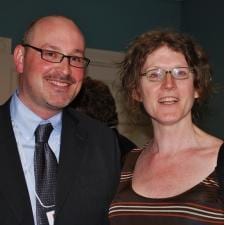
POLY PLEASURES. Namaste's current research focusses on the HIV-education needs of bisexuals and swingers. See polyvalance.ca. Credit: Le-Ann Dolan, ACT
Noted Montreal academic, author and activist Viviane Namaste has been awarded the 2009 Canadian Award for Action on HIV/AIDS and Human Rights for her efforts to address the HIV prevention and treatment needs of trans people, bisexuals and the swingers community.
Namaste accepted the award in Toronto Jun 12, at From Evidence and Principle to Policy and Practice, the first annual Symposium on HIV, Law and Human Rights organized by the Canadian HIV/AIDS Legal Network. The award, co-presented by the international advocacy group Human Rights Watch, has been presented annually since 2002. Namaste was nominated for the award by Montreal community organizer Jenn Clamen.
Presenting the award, Clamen described Namaste as “a personal hero” for her efforts to understand and address the specific HIV-related needs of the bi, trans and migrant sex work communities. “There are people in our lives who display such bravery, unabashed drive and brutal strength they inspire the entourage of students around them, incite change and evolve a community,” said Clamen of Namaste, addressing a packed house at Toronto law school Osgoode Hall.
Namaste, who is the research chair in HIV/AIDS and sexual health at the Simone de Beauvoir Institute at Concordia University, provided the crowd with a chilling education about increasing HIV rates among trans sex workers around the world. When she first got involved in trans HIV issues in the early ’90s, she said, the prevalence of HIV among trans people was double that among gay men.
Today for trans people involved in sex work, things are even worse. In Lisbon, for example, almost 47 percent of trans sex workers are HIV-positive; in Atlanta, the number is 68 percent. Namaste cited a study of drug-using transsexual and transvestite sex workers in Rome; after four years, every participant in the study had HIV.
“Where is the political will around this population and its reality?” Namaste asked the assembled lawyers and community advocates. “How is it that transsexuals have the highest rates of HIV seroprevalence in the industrialized world, and they are still not recognized as a vulnerable population in Canadian state policy and in international policy?”
Namaste’s current research involves understanding the HIV prevention needs of bisexual men and women and Montreal’s active swingers community, and includes an informational website at polyvalence.ca. “Why is it that bisexuality is something that we talk about all the time in HIV work — but you can never find a poster or pamphlet specific adapted to the realities of bi men and women in the Canadian context?” she asked.
Also awarded the same evening was Michaela Clayton, a widely respected lawyer and activist from Namibia who co-founded the AIDS and Rights Alliance of Southern Africa (ARASA), a regional network of 35 organizations working in partnership across southern Africa to defend and promote human rights in the response to HIV/AIDS and tuberculosis.

 Why you can trust Xtra
Why you can trust Xtra


